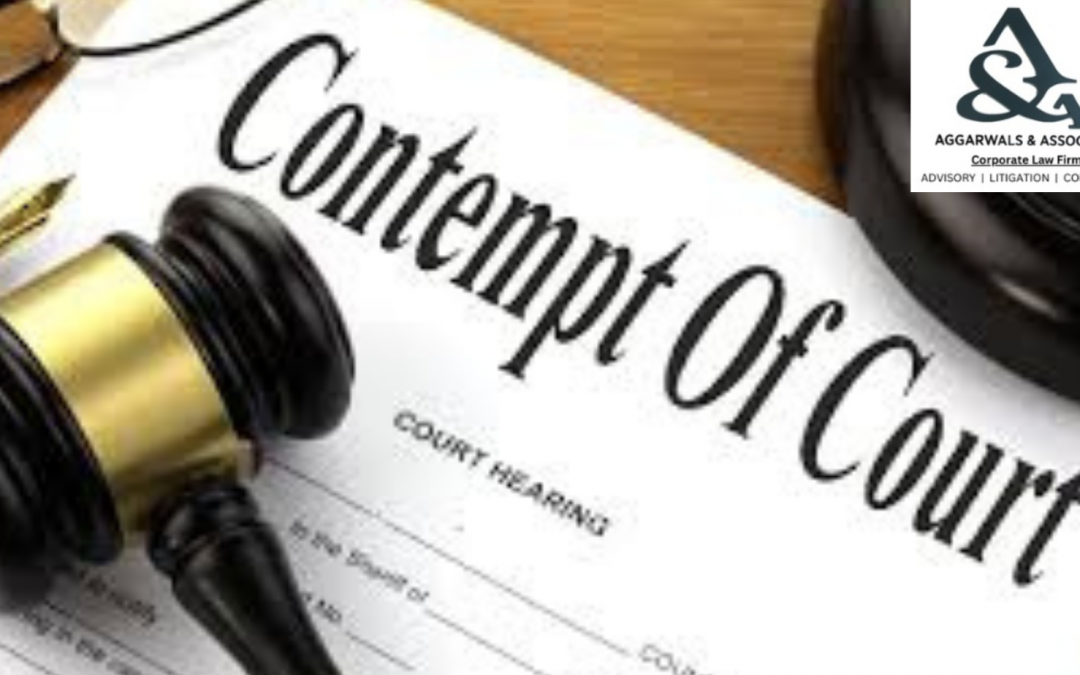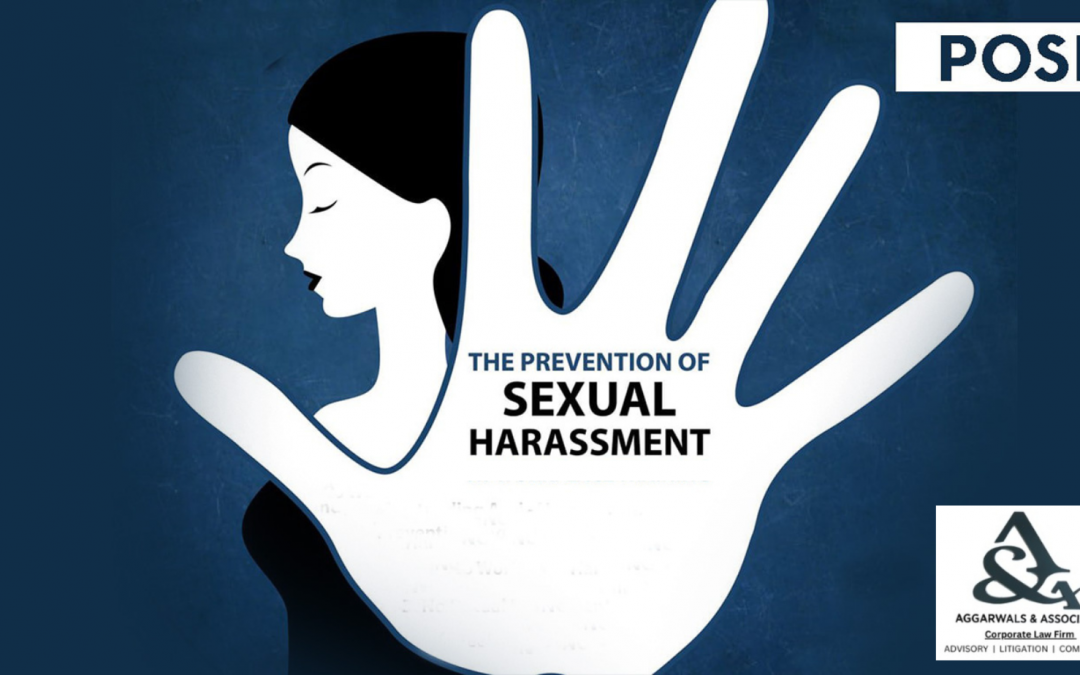
by Aggarwals Associates | Mar 31, 2023 | Criminal Lawyers, General
Before going into details, one must need to understand these basic terms i.e. Media and Contempt of Court. Media are the communication outlets or tools used to store and deliver information or data. The term refers to components of the mass media communications industry, such as print media, publishing, news media, photography, cinema, broadcasting, digital media, and advertising. Media is essential to our society, serving as a watchdog and holding those in power accountable for their actions. However, the freedom of the press is not absolute and can be restricted in certain circumstances, such as contempt of court.
Contempt of court refers to any act that obstructs or interferes with the administration of justice.
Media and Contempt of Court: What is it?
Contempt of court can be divided into two categories: civil contempt and criminal contempt. Civil contempt refers to disobedience of court orders, while criminal contempt is any act that tends to interfere with the administration of justice. Media can be held in contempt of court if they publish or broadcast anything that tends to prejudice the administration of justice or interfere with the due process of law.
Examples of contempt of court by the media can include publishing details of a defendant’s criminal history or previous convictions before the trial or revealing the identity of a victim or a witness in a sexual assault case. In such cases, the media may not have intended to interfere with the administration of justice, but the impact of their actions can be severe.
Implications of Contempt of Court by the Media
The implications of contempt of court by the media are significant. It can undermine the fairness of a trial, resulting in a mistrial or the acquittal of a guilty defendant. Moreover, it can jeopardize the safety of victims, witnesses, and even judges, who may be targeted for reprisal or intimidation.
Contempt of court by the media can also erode public confidence in the justice system. If the public perceives that the media is influencing the outcome of a trial, they may lose faith in the impartiality and integrity of the courts, which can have long-term consequences for the rule of law.
How to Avoid Contempt of Court
Avoiding contempt of court requires a nuanced understanding of the law and a commitment to ethical journalism. The media should refrain from publishing or broadcasting anything that can prejudice the administration of justice, such as details of a defendant’s criminal history or previous convictions before the trial, or the identity of a victim or a witness in a sexual assault case.
Moreover, the media should respect court orders, such as suppression orders or publication bans, and seek legal advice before publishing or broadcasting anything that may breach these orders. They should also ensure that their reporting is fair, accurate, and balanced and that they give equal weight to the prosecution and the defence.
Conclusion
Media plays a crucial role in our democracy, but that role comes with certain responsibilities. Contempt of court by the media can have severe implications, and journalists must be mindful of the impact of their reporting on the administration of justice. By adhering to ethical standards and the law, the media can ensure that their reporting is fair, accurate, and does not prejudice the outcome of a trial.
-Surbhi Singla
Associate at Aggarwals and Associates, SAS Nagar, Mohali

by Aggarwals Associates | Mar 28, 2023 | Criminal Lawyers, Divorce Lawyer, General
Article 142 of the Indian Constitution grants the Supreme Court the power to pass any order necessary for doing “complete justice” in any case or matter pending before it. This provision is often seen as a powerful tool in the hands of the judiciary to provide justice in situations where the law is inadequate or insufficient. However, the use of this provision has also been a subject of much debate, with some arguing that it undermines the principle of separation of powers and can lead to judicial overreach. In this blog, we will discuss the need for judicial restraint while exercising the powers granted under Article 142. The bare language of Article 142 is as follows: “ Enforcement of decrees and orders of Supreme Court and unless as to discovery, etc ( 1 ) The Supreme Court in the exercise of its jurisdiction may pass such decree or make such order as is necessary for doing complete justice in any cause or matter pending before it, and any decree so passed or orders so made shall be enforceable throughout the territory of India in such manner as may be prescribed by or under any law made by Parliament and, until provision in that behalf is so made, in such manner as the President may by order prescribe
- Subject to the provisions of any law made in this behalf by Parliament, the Supreme Court shall, as respects the whole of the territory of India, have all and every power to make any order for the purpose of securing the attendance of any person, the discovery or production of any documents, or the investigation or punishment of any contempt of itself”
The principle of separation of powers is a cornerstone of democracy, which ensures that no branch of the government becomes too powerful. The legislature makes laws, the executive implements them, and the judiciary interprets and applies them. However, in some cases, the law may not be able to provide a remedy for a particular situation. In such cases, the judiciary may have to step in and provide a solution using its inherent powers. Article 142 grants the Supreme Court the power to do just that. However, this power must be exercised with caution and restraint.
One of the main arguments against the use of Article 142 is that it can lead to judicial overreach. The Supreme Court is not meant to legislate or make policy decisions. Its role is to interpret and apply the law. When it uses Article 142 to pass orders that go beyond what is provided in the law, it can be seen as encroaching on the powers of the legislature and the executive. This can be particularly problematic when the orders passed under Article 142 have far-reaching implications that affect the rights and freedoms of citizens.
Another concern with the use of Article 142 is that it can undermine the rule of law. The rule of law requires that all actions of the government, including the judiciary, are subject to the law. When the Supreme Court passes orders under Article 142 that are not based on any legal provisions, it can be seen as arbitrary and unfair. This can erode public trust in the judiciary and the rule of law.
Therefore, it is essential that the Supreme Court exercises restraint while using the powers granted under Article 142. The court must ensure that its orders are based on established legal principles and are not arbitrary or unfair. It should also ensure that its orders do not encroach on the powers of the other branches of the government. This requires a careful balancing of the interests of justice with the principles of democracy and the rule of law.
In conclusion, Article 142 is a necessary provision that allows the Supreme Court to provide justice in situations where the law is inadequate or insufficient. However, its use must be tempered with caution and restraint. The Supreme Court must ensure that its orders are based on established legal principles and do not undermine the principles of democracy and the rule of law. By doing so, it can uphold its role as the guardian of the Constitution and the protector of the rights and freedoms of citizens.
–Surbhi Singla
Associate at Aggarwals & Asssociates, Mohali

by Aggarwals Associates | Jan 30, 2023 | Criminal Lawyers, General
The definition of sexual harassment is well-defined in the POSH Act, It states that “sexual harassment is any unwelcome sexual behavior, whether directly expressed or implied, and includes the case of physical contacts and advances, or sexual favour demanded or requested, or making remarks with sexual overtones, or showing pornography or other offensive material, or acting in an unwelcome sexual manner through physical, verbal, or non-verbal means.
What are the different provisions under PoSh Act?
Conciliation: Conciliation plays an important role in dispute resolution as it is always gives win- win solutions to the parties. It is an effective form of ADR ( Alternative Dispute Resolution) mechanism in which a third party, conciliator helps in resolving the dispute by giving multiple solutions to both of the parties. The matter related to the POSH can be resolved by the method of conciliation but it cannot be resolved on monetary terms.
Interim Relief: The victim can get one of the following interim reliefs in the POSH Act:
Relocation for any of them.
There is a provision of 3 months’ leave for the aggrieved women.
Confidentiality Report
Punishment for false complaint:
The Act consists of provisions for the false complaint to prevent bogus allegations and to protect the interest of employees. The provisions of false complaints are very essential to protect the innocents. The person filing false complaint will be entitled to one of the following punishments:
A written apology letter by the complainant.
The promotion of such a person can be withheld by the company.
The pay rise or increment can be withheld by the company.
Termination of services, etc.
View of Legislation on false complaint related to sexual harrasment at work place
The High Court of Delhi imposed a hefty fine of Rs. 50000 on the petitioner
for filing a false case against the respondent in the case named Anita Suresh
vs Union of India & Others, P (C) 5114/2015. This clearly states that the
legislation is strict for false and misleading complaints.
The legal procedure to file a complaint of sexual harassment?
The victim can complain to the internal committee in the company and then to the complaint committee. Also, the aggrieved person can claim under various other provisions provided under Indian legislation such as sec 354 of IPC (Indian Penal Code)
It is pertinent to mention here that the time period for filing a complaint is three months but can be further extended to three months depending on circumstances. Moreover, if the victim herself is not able to complain she can complain through the appropriate person as provided under the legislation.
What are the different loopholes in the POSH Act?
Gender Biased: The provisions stated in the Act is specifically for female employee that depicts that only women are subjected to sexual harassment. This is the major drawback of the legislation that it is gender biased.
No protection for the informal sector: The legislation does not have specific provisions for the informal sector, this shows that the legislation is biased toward the informal sector as the complaint by this sector is not taken into consideration.
The legislation deals with all the basic provisions such as definition, punishment, and appropriate channels to complain. Also the Acts contains provisions for false complaints that is utmost necessary in this legislation. Every employer should add the provisions for sexual harrasment to ensure healthy environment at work place in their employee manual and also to take initiative for arranging awareness campaign at fixed intervals of time.
Surbhi Singla
Associate at Aggarwals & Associates, S.A.S Nagar, Mohali

by Aggarwals Associates | Jan 24, 2023 | Criminal Lawyers, General, Labour Law Lawyers, MSME, Parliament
The Sexual Harassment of Women at Workplace (Prevention, Prohibition, and Redressal) Act, 2013(herein after referred as PoSH Act) is the first and the only legislation in Indian laws that deal specifically with sexual harassment of Women at the workplace. Though, India has several criminal and civil provisions that are related to sexual harassment and also have prescribed punishment for the same under section 354 of the Indian Penal Code (hereinafter referred to as IPC) which speaks about outraging the modesty of a woman. The defined punishment of which is 1 year of imprisonment or fine or can be both depends on the discretion of the court.
What is Sexual harassment?
The definition of sexual harassment is well-defined in the POSH Act, It states that “sexual harassment is any unwelcome sexual behaviour, whether directly expressed or implied, and includes the case of physical contacts and advances, or sexual favour demanded or requested, or making remarks with sexual overtones, or showing pornography or other offensive material, or acting in an unwelcome sexual manner through physical, verbal, or non-verbal means.
Who is Employee under the PoSH Act?
Section 2(f) “employee” defines any person employed at a workplace on a regular, transitory, ad – hoc basis, or daily salary basis, whether directly or via an agency, including a contractor, for any task, with or without the knowledge of the principal employer, whether for remuneration or not, or working voluntarily or otherwise, whether the terms of employment are express or implied, and entails a co-worker, probationer, a contract worker, trainee.
What are the different objectives of the PoSH Act?
PoSH is an act to protect, prevent and prohibit sexual harassment of women at workplace. The main objective of the PoSH Act is to provide a safe and healthy workplace to each and every employee of any organisation. In addition to this it is essential to give a dignified life to all their female employee. The sexual harassment not only means physical torture but it also includes passing sexual comments, bullying, body shaming, taunting and other minor things by the colleagues and higher authorities.
What are the two main committees constituted under PoSH Act?
The two main committees constituted under PoSH Act for preventing the sexual harassment at work place: Internal and Local Committees.
Internal Committee: It is mandatory for every organisation to set up an internal committee if the company is equipped with more than 10 or more employees. The committee is to be formed under the provisions of the PoSH Act and the quorum of members is to be decided according to the provisions of the legislation. The non-compliance of which will attract a fine of Rs.50,000.
Local committee: A local committee is established in each district for dealing with the matter of sexual harassment in the workplace. Before registering the complaint in the local committee, one should go to the internal committee. The committee is established under Section 5 of the PoSH Act by repealing &the Amendment Act of 2016.
Powers of the committee: With the introduction of two different committees, powers are also specified in the Act. The committee can
- Summon and interrogate the accused person under the oath.
- Can ask for the discovery of documents.
- Any other things that are essential for the case.
The legislation deals with all the basic provisions such as definition, punishment, and appropriate channels to complain for any sort of physical and mental harassment faced by any women at their workplaces and it also assures that the women stays safe.
–Surbhi Singla
Associate at Aggarwals& Associates, S.A.S, Nagar Mohali.

by Aggarwals Associates | Jul 15, 2021 | Criminal Lawyers
It is evident to say that it is a difficult undertaking for a layman to discover the Best Criminal Lawyers in Chandigarh owing to a lack of knowledge about the legal circle. Internet is an ocean of information and it is flooded with numerous websites which provide a listing of lawyers in various cities by diving them into different categories. A vast majority of individuals rely on the information given on the internet whereas, some people put faith in personal references. However, you can find solutions for your all legal troubles by making contact with one of the Best Law Firms in Chandigarh namely Aggarwals & Associates which provides a team of the best Criminal Lawyers in Chandigarh.
Our Criminal Lawyers possesses the huge experience and great knowledge which help clients to get positive outcome before the court of law.
How to make the search for Criminal Lawyers in Chandigarh?
You can make the search for Criminal Defence Attorney in Chandigarh via online mode for example by using search engines like Google and Bing etc. Thereafter, you need to figure out some lawyers dealing in criminal cases having good ratings and reviews. Apart from this, you can even visit the online website of selected lawyers to get some information like the experience of such a lawyer, what is his/her primary area of practice, and what is the fee structure, etc.
Moreover, there are countless legal directories that categorize lawyers according to their area of practice and place of practice as well. These platforms also give ratings to the lawyers on the basis of queries resolved as well client satisfaction.
On the contrary, you can choose a Criminal Lawyer from suggestions you received from your friends, family members, and colleagues, etc. It’s up to you to decide about the way of making a search as per your comfort.
What qualities do Criminal Lawyers must have?
Justice matters to society as it makes survival possible for each and every individual on earth. Hence, you must ensure that you have hired the Best Criminal Lawyers in Chandigarh in your legal journey to seek justice from the court. The criminal trial consists of various stages; therefore, it is important to protect your rights at each and every stage. It is only the top-rated Criminal Lawyer who can protect your best interests during court proceedings.
The following are some qualities you should look for in your Criminal Lawyer: –
- Experience: – A Huge experience in litigation reflects the good impression of a Criminal Lawyer. If you go with a lawyer with less experience, you might get yourself into trouble. Even if you are facing charges under a small offense, it is mandatory to select an experienced lawyer to defend your case.
- Communication: – Communication between you and your lawyer is extremely important. It’s vital that you have a Criminal Lawyer who is easily accessible. Effectual communication with your lawyer will assist you to understand the laws applicable in your case as well as remedies available for you.
- Representation: – Your criminal lawyer should have good oratory proficiency and be able to maintain dedication, willpower, and focus to accomplish the best possible outcome in your case. A strategic approach must be adopted by your lawyer while representing your case before the court.
- Knowledge: – You have to hire a legal professional who specializes in criminal law. A well-informed criminal lawyer will be familiar with your case and can come up with a suitable defense to help you get out of the problem.
- Analytical skills: – Since you are searching for the Best Criminal Lawyers in Chandigarh, so it is always advisable to finalize the one with wonderful analytical skills. Having analytical skills is required in the present times there is a huge number of legal practitioners out there. There are some situations where the lawyer has to manipulate the facts before the court so he/she must be able to use this art. So it is fundamental to be careful while choosing Criminal Lawyers in Chandigarh.

by Aggarwals Associates | Jul 1, 2021 | Criminal Lawyers
It is a crucial factor that which Criminal Lawyer in Chandigarh you choose to retain for a legal matter. And of course, you should reach to a conclusion after thoughtful consideration. The best way to choose a Criminal Lawyer by having a face-to-face meeting once you have shortlisted the criminal lawyers after making an online search for them. By going through the in-person meeting you will come to know about things like whether that lawyer has enough experience and qualification to handle your case, and whether you will be comfortable while working with such a lawyer or not, on and on. If you will have a decent working relationship with an attorney, it will play a pivotal role in achieving your desired goal. So, you must raise some important queries before hiring a Criminal Lawyer in Chandigarh for your case.
How much experience Criminal Lawyer possesses in criminal litigation?
The first and foremost question is to ask is about the experience of the lawyer as it is one of the responsible factors for a positive result in your case. If a lawyer doesn’t have much experience in handling criminal litigation then it is quite obvious that such Criminal Lawyer is not enough competent to handle your case. Although a simple case could be handled by a lawyer having moderate experience, but it is an undeniable factor that there are innumerable technicalities in litigation that could be handled by a lawyer with vast experience only. Litigation is not a game of layman as it involves series of events that are required to be dealt with due diligence.
Is the lawyer has experience of dealing with any case similar to yours?
Naturally, it be must be asked from a Criminal Lawyer in Chandigarh so that you could have contentment that you are at the right place. It will be easy for you as well as your attorney if your Criminal Lawyer has already dealt with a similar matter. Previous experience of handling a similar matter can indeed work wonders for the upcoming one. Your lawyer will already have a strategy for this kind of case and know how to get the best-suited result out of it. If your Criminal Lawyer in Chandigarh has experience with cases like yours before, then such a lawyer will be able to provide you some guidance especially relating to the remedies and result of litigation as well.
How much is the fee?

Deciding about how much fees you can pay to a lawyer is also a complex situation as numerous people find it an economical hardship. Everyone wants to hire the best lawyer but sometimes higher fees for such a lawyer caused a financial burden for many. So, you should be concerned about the fees of a Criminal Lawyer in Chandigarh before hiring that whether you can afford the legal fee or not. However, the legal fee of any Criminal Lawyer in Chandigarh is depended upon the nature of the case. If your case is not much complex then you may need to pay fewer fees. Similarly, if your matter involves complexities then the fee could be on the higher side.
What remedies are available?
A person facing any criminal litigation should ask his/her Criminal Defence Lawyer in Chandigarh about the remedies available under the law. It is important to know about legal remedies available under the law so that you can get an idea about solutions for your problems. There are chances that you may be eligible for additional relief according to the circumstances of your case, so in that case, you will be able to get those reliefs by discussing the same with your Criminal Lawyer in Chandigarh.
How often will we communicate?
Criminal litigation consists of various stages so it would be better to ask your Criminal Lawyer in Chandigarh about the frequency of making contact with each other. As sometimes due to the overburden of cases a lawyer might forget to inform you about your case status. So, it must be cleared in the beginning from the Criminal Lawyer about the frequency of making contact with the clients.
What is the success rate of a Criminal Lawyer?
While every case is unique itself, but a lawyer who has a remarkable record of success in cases would be able to bring the best possible outcome for you. The success rate of the Criminal Lawyer in Chandigarh can describe you about the expertise and skills of a lawyer that you are going to hire for your case.
So, these are few questions you must ask your Criminal Lawyer before appointing for your case. We, Aggarwals & Associates consist of a team of the Best Criminal Lawyers in Chandigarh to handle all kinds of criminal litigation. If you are confronting with any criminal matter then feel free to contact us to get the best possible outcome in your matter.
Also Read: Do You Need the Help of a Criminal Lawyer in Chandigarh?









Recent Comments